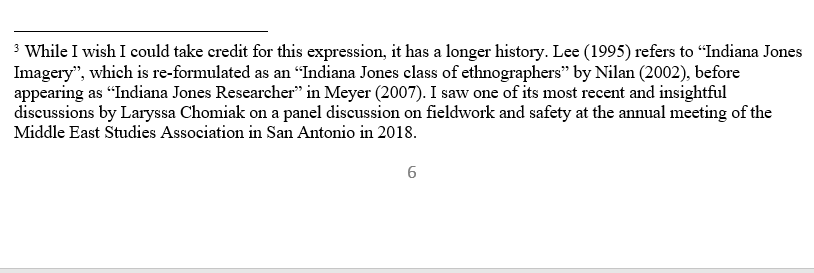I wrote a chapter for “The Companion to Peace and Conflict Fieldwork”. It argues that
1) Key security decisions in the field are made by researchers, alone
2) Indiana Jones researchers and Data Gathering Robots are making us less safe
A thread summary: 1/ https://link.springer.com/chapter/10.1007/978-3-030-46433-2_11">https://link.springer.com/chapter/1...
1) Key security decisions in the field are made by researchers, alone
2) Indiana Jones researchers and Data Gathering Robots are making us less safe
A thread summary: 1/ https://link.springer.com/chapter/10.1007/978-3-030-46433-2_11">https://link.springer.com/chapter/1...
Ok, let& #39;s start with this: most decisions that affect the safety and risk of researchers in the field are taken by these researchers, alone, and usually without much time to think. No amount of risk assessment procedures will change that. And it& #39;s crucial to recognise that. 2/
Now, that& #39;s not necessarily a bad thing. After all, it& #39;s our health, our safety, and we are usually in a better position to make these calls than a bureaucrat thousands of miles away. In the cracks of risk assessments, we do our work.
3/
3/
Remembering this brings many things into focus: the importance of preparation, of giving researchers tools and options, the limits of bureaucracy. But what I want to focus on here is this:
when we make these decisions, what is on our minds is crucial to our safety.
4/
when we make these decisions, what is on our minds is crucial to our safety.
4/
So, when researchers make decisions about their safety, what& #39;s on their mind? Assumptions about what kind of risk is normal. Pressures about their project, livelihood, career. All of this connects to how we talk about risk in academia.
And this is where this story gets dark.
5/
And this is where this story gets dark.
5/
Academia is FULL of incredibly toxic discourses about risk and safety, especially for junior researchers.
I& #39;ve picked out four archetypes as the protagonists of these discourses:
6/
I& #39;ve picked out four archetypes as the protagonists of these discourses:
6/
First, the INDIANA JONES RESEARCHER(3). We all know one. Did some research in a security sensitive context. Won& #39;t shut up about it. Lives at the pub now. Full of outrageous tales of danger and questionable research ethics. Let& #39;s face it, usually male.
Aside from all the havoc they may wreak in their place of work, Indiana Jones Researchers (a) help normalise wildly unreasonable expectations about what a reasonable level of risk is and (b) commodify bad research practice as desirable pub vignettes.
Second, THE SUFFERING RESEARCHER. Treats risk exposure and psychological exhaustion as a direct proxy for research quality. Says things like ‘Good fieldwork needs to hurt’ or ‘researching war should fuck you up’. Often did most of their fieldwork 30 years ago.
9/
9/
Again, this discourse normalises risk for risk& #39;s sake. It makes it harder especially for junior researchers to extract themselves from harmful situations in fear that they will be judged by their peers and superiors. Really prevalent. Really toxic.
10/
10/
Third, the DATA GATHERING ROBOT. (originally wanted to call him the brain on a stick, in reference to this lovely @xkcd comic). It& #39;s how a scary part of the methods literature still conceptualises researchers: no fears, no needs. Maybe a positionality, but no personality.
11/
11/
Needless to say, this contributes to a substantive discussion of security, risk-taking and mental well-being in the field, especially in departments and disciplines that don& #39;t have a long history of doing ethnographic work.
12/
12/
Finally, the CAREER RISK TAKER. Junior scholars and PhD students feeling stuck between risky fieldwork and deadlines. Feeling that not taking a certain risk will hurt them on the academic job market. This was me. This is many of us. This is structural. And this is dangerous.
13/
13/
What follows from all of this is that in order to make fieldwork safer, especially in complex environments, we need to pay attention to how we speak about risk and safety in the academy. But also, as the last archetype highlighted, this is tied to structural dynamics.
14/
14/
We need to talk more openly about risk in the field. We need to show more vulnerability, reflect our decisions, and how we felt. We need to make each other feel less alone. Get honest about fieldwork. This was part of the idea behind this entire volume, and it& #39;s essential.
15/
15/
All of this needs to be a part of graduate training, and of the (increasingly bureaucratised) risk management process at universities. A-priori risk assessment processes need to be complemented with giving people the skills to engage with risky situations on the ground.
16/
16/
But all this also connects to the structural pressures that many junior scholars are under. Pressures to deliver, low flexibility with PhD and project deadlines, the job market. These are on people& #39;s mind when they think about risk. And makes them less safe.
17/
17/
This volume is full of chapters that get real about fieldwork, and honestly reflect on experiences, decisions and their effects. Here& #39;s the link, go get it for you/your university& #39;s library. It& #39;s starting a conversation we desperately need to have.
https://www.palgrave.com/gp/book/9783030464325
18/">https://www.palgrave.com/gp/book/9...
https://www.palgrave.com/gp/book/9783030464325
18/">https://www.palgrave.com/gp/book/9...
Ok, thanks for reading - the full chapter hopefully makes these points a little more substantively. As always, all typos are intentional.
And thank you to the editors @rogermacginty, @birtevogel_ Roddy Brett for having me & for the comments and support on this chapter.
19/end.
And thank you to the editors @rogermacginty, @birtevogel_ Roddy Brett for having me & for the comments and support on this chapter.
19/end.
PS: @jannisgrimm, king of the twitter poll. https://twitter.com/jannisgrimm/status/1300783023890329601">https://twitter.com/jannisgri...

 Read on Twitter
Read on Twitter



